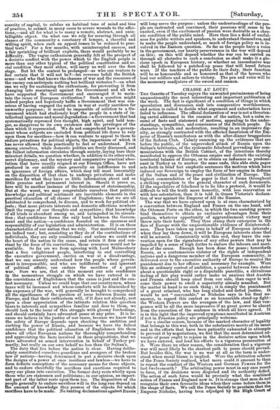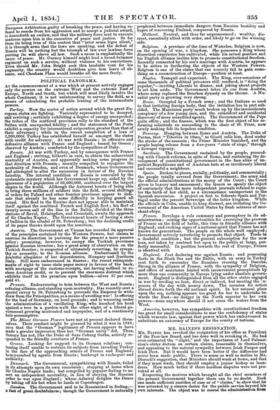CFLASSE AU LOITP I
THE Gazette of Tuesday enjoys the unwonted pregminence of being unquestionably the most interesting and important publication of the week. The fact is significant of a condition of things in which speculation and discussion sink into comparative worthlessness, and action is called to decide what argument and exhortation have failed to influence. The official declaration of war is not a threaten- ing cartel addressed to the enemies of the nation, but a calm re- slime of facts and statement of motives, appealing to the under- standings, sympathies, and consciences of the British people. Its character is truth and moderation, resulting in an impressive dig- nity, as strongly contrasted with the affected fanaticism of the Em- peror peror of Russia's manifestoes as with the after-dinner braggadocio
of the Reform Club. Calmly summing up the evidences are before the public, of the unprovoked attack of Russia upon the Sultan's territories, of the systematic falsehood Rervading her com- munications with the British Cabinet, of the intentions thereby manifested to oppress the Ottoman empire and disturb the existing territorial balance of Europe, or to obtain an influence so predomi- nant in Turkey as to answer the same ends, this able state paper sets forth in brief but emphatic sentences the motives which have induced our Sovereign to employ the force of her empire in defence of the Sultan and of the peace and civilization of Europe. The highest commendation of the paper is that it forms throughout a striking exception to the general character of such documents. If the superlative of falsehood is to lie like a protocol, it would be difficult to tell the truth more honestly, with less reservation or with less ostentation, than it is told in Queen Victoria's declara- tion of war against the Emperor of All the Russias. The war that we have entered upon is at once characterized by a convention between England and France on the one hand, and the Ottoman Porte on the other, in which the two assisting powers bind themselves to obtain no exclusive advantages from their position, whatever opportunity of aggrandizement victory may throw into their hands. They thus stamp their enterprise in the face of Europe with the unquestionable evidence of disinterested- ness. They have taken up arms in behalf of European interests ; when they lay them down, it will be European interests alone that will be secured. Consistently with this end, they leave the con- vention open for the signatures of any other powers that may be impelled by a sense of high duties to endure the labours and sacri- fices of the cause. Enough has been done for peace ; henceforth Russia, as a contumacious violator of the rights of independent nations and a dangerous member of the European community, is delivered over to the executive authority of Europe to receive the punishment due to her offence and necessary for example. Were this an ordinary contest of ambition, a quarrel between two states about a questionable right or a disputable punctilio, a chivalrous feeling of fair play would rather make us anxious that Austria and Prussia should keep aloof from our side than eager to wel- come their power to swell a superiority already manifest. But the matter in hand is no such thing; it is simply the punishment of a great criminal, who has long eluded and defied justice. It would be not "convenable," as Nicholas says in his final no- answer, to regard this contest as an honourable stand-up fight: the Western Powers are the avengers of the law, and that ven- geance will be all the more impressive if no great power be absent from the execution of the sentence in which all have agreed. It is in this light that the improved symptoms manifested in Austrian if not in Prussian policy are principally welcome.
For a similar reason, because of the marked character of legality that belongs to this wax, both in the substantive merits of its cause and in the efforts that have been patiently exhausted in attempts to prevent it by-negotiations, we feel that the most determined ad- vocate of peace ought to rejoice in the decisive action upon which we have entered, and lend his efforts to a vigorous prosecution of it. Were there no other reason the consideration that a vigorous war will most likely be the shortest path to peace should prevail. But besides this, the war is no war at all as the term is under- stood when moral blame is implied. Were the arbitration scheme of the Peace Society realized, what more could it amount to tin= to repeat the conduct of the Western and German Powers for the last twelvemonth ? The arbitrating power must in any case resort to force, if its decisions were disputed and its authority defied. The action of such force would be precisely what the oombined action of France and England now is. It is strange that men do not recognize their own favourite ideas when they come before them in the shape offsets. We call the Peace Society to proclaim that the Emperor Nicholas, having been adjudged by the High Court of
European Arbitration guilty of breaking the peace, and having re- fused to recede from his aggression and to accept a judicial award, is henceforth an outlaw, and that the military force sent to execute sentence upon him is the executive of peace and justice. So fax from its being true of this contest that "inter arms leges silent," it is through arms that the laws are speaking, and the defeat of Russia will be nothing but the triumph of law over lawless force putting its will above sinew. Such a cause is emphatically the cause of peace. Mr. Gurney himself might lead a broad-brimmer regiment on such a service, without violence to his convictions. Even should Mr. John Bright seek this laudable vent for his pugnacity, the country would doubtless give him leave of ab- sence, and Chesham Place would breathe all the more freely.



































 Previous page
Previous page